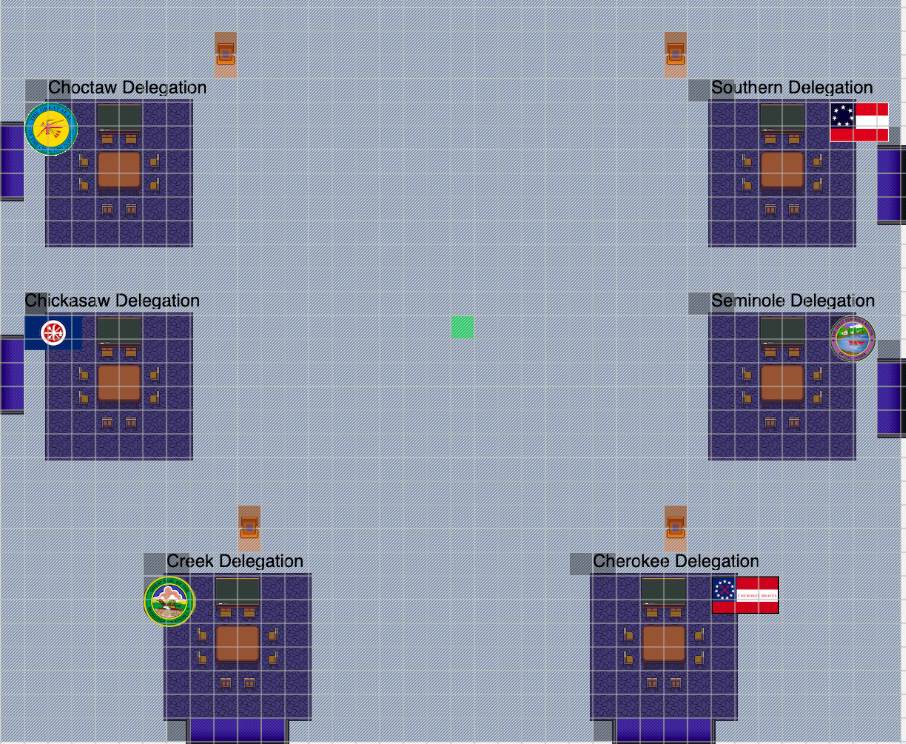
By: Dr. Rowan Steineker and Dr. Jeff Fortney
Assistant Professors of History
Florida Gulf Coast University
“Very complex,” “too many issues,” “might be overwhelming for undergraduates” are just a few examples of the constructive feedback we received about our game Between Two Fires: The Civil War Comes to Indian Territory at the 2019 Game Development Conference. If this was the response from seasoned Reacting veterans and game designers, we knew students could be in way over their heads. While revising, we realized that our proximity to the subject matter may have obscured our sense of the student experience. And though we still have work to do on Between Two Fires, we have since made monumental progress thanks to an invaluable collaborator: a student research assistant. For three semesters, we have worked with our student, Katherine Ryan, and in the process discovered many mutual benefits for partnerships in designing Reacting to the Past games.
We aren’t the first to propose student collaboration. The topic has been discussed in the faculty lounge and several Game Development Conferences and workshops, but always with some hesitation. Many—rightly so—worry about exploiting students, an already oft over-exploited group. Fortunately, our school, Florida Gulf Coast University, supports a Work-study in Scholarly Experiential Research Program which pays students to collaborate with faculty and engage in professional development workshops. While not every university may extend such opportunities to their students and faculty, we do encourage game designers to look for similar paid pathways to engage their students in Reacting to the Past research and game design.
Collaborating with a student research assistant has several advantages for faculty, beyond passing off the mundane tasks. Did we want to transcribe dozens of handwritten, 19th century documents? No, not really. But, Katherine’s contributions went well beyond that. She extensively researched primary sources, drafted character sheets, and helped design game mechanisms.
 Most importantly, she provided a student perspective that allowed us to better recognize the needs and challenges of our target audience. For instance, she revealed that even after considerable time researching, she still grappled with understanding one of the game’s major issues for debate, and was concerned that other students would as well. She also developed a “Reacting Tips for Success” guide, drawing on interviews with fellow students as well as her own experiences in Reacting to the Past games. When we shifted to online courses amidst the Covid-19 pandemic, Katherine developed a Gather.Town space to test and adapt the game for online play (seen in the photo).
Most importantly, she provided a student perspective that allowed us to better recognize the needs and challenges of our target audience. For instance, she revealed that even after considerable time researching, she still grappled with understanding one of the game’s major issues for debate, and was concerned that other students would as well. She also developed a “Reacting Tips for Success” guide, drawing on interviews with fellow students as well as her own experiences in Reacting to the Past games. When we shifted to online courses amidst the Covid-19 pandemic, Katherine developed a Gather.Town space to test and adapt the game for online play (seen in the photo).
It is difficult to overstate just how integral Katherine became to the ongoing development of our game. Our experience is just one example of engaging students as partners in pedagogy. Research on student-faculty partnerships in learning and teaching indicate outcomes that are mutually advantageous: including deeper engagement, greater awareness, and more effective classroom experiences.1
While our collaboration supports these outcomes, we suggest there are additional specific benefits for students who face pernicious questions of “What are you going to do with that degree?” from “that uncle” at the Thanksgiving table. Just as participating in Reacting to the Past games helps students build many transferable skills, researching and developing Reacting to the Past games can offer these same benefits and more. The opportunity to work one-on-one with professors on research and pedagogical design provides a concrete professional development experience for undergraduates. The National Association of Colleges and Employers identifies eight Career Readiness Competencies, including: 1. Career & Self-Development; 2. Communication; 3. Critical Thinking; 4. Equity & Inclusion; 5. Leadership; 6. Professionalism; 7. Teamwork; 8. Technology.2 In one way or another, our student partner demonstrated competency in all of these areas over the course of our collaboration.
You don’t have to just take our word for it! Our student Katherine secured an internship transcribing documents for the National Parks Service because of her experience researching and transcribing primary sources. She has since parlayed that internship into a paid position digitizing oral history collections. She has also presented at numerous conferences, has a forthcoming peer-reviewed publication, and has been appointed project manager of a university-wide digital mapping project. Full disclosure: she is an outstanding and ambitious student and we cannot take credit for her accomplishments. Nevertheless, it has been a pleasure to help her build key, transferable skills, and to find they are highly desired by employers…and not to have to transcribe all those documents.
1. Alison Cook-Sather, et. al, “Guidelines for Student and Faculty Partners,” Students as Learners and Teachers (SaLT) Program, Teaching and Learning Institute at Bryn Mawr and Haverford Colleges 2019.
2. National Association of Colleges and Employers, “Career Readiness: Competencies for a Career-Ready Workforce Guide,” Revised & updated March, 2021.
About the Authors
Jeff Fortney is an Assistant Professor of History at Florida Gulf Coast University. His areas of research and teaching include United States history with a focus on the Native American, African American, and Civil War history. Rowan Steineker is an Assistant Professor of History at Florida Gulf Coast University. Her research focuses on the history of education and the American West. Additionally, she teaches courses in Public History and Digital Humanities.
Blog Author Questionnaire
One word to describe faculty: Resilient
Two words to describe (your) school: Scenic Swamp
Three words to describe students: Underestimated, Hardworking, Creative
Four words to describe favorite games: Excessive strategy and drama
Five words to describe Reacting: Making history pedagogy great again


